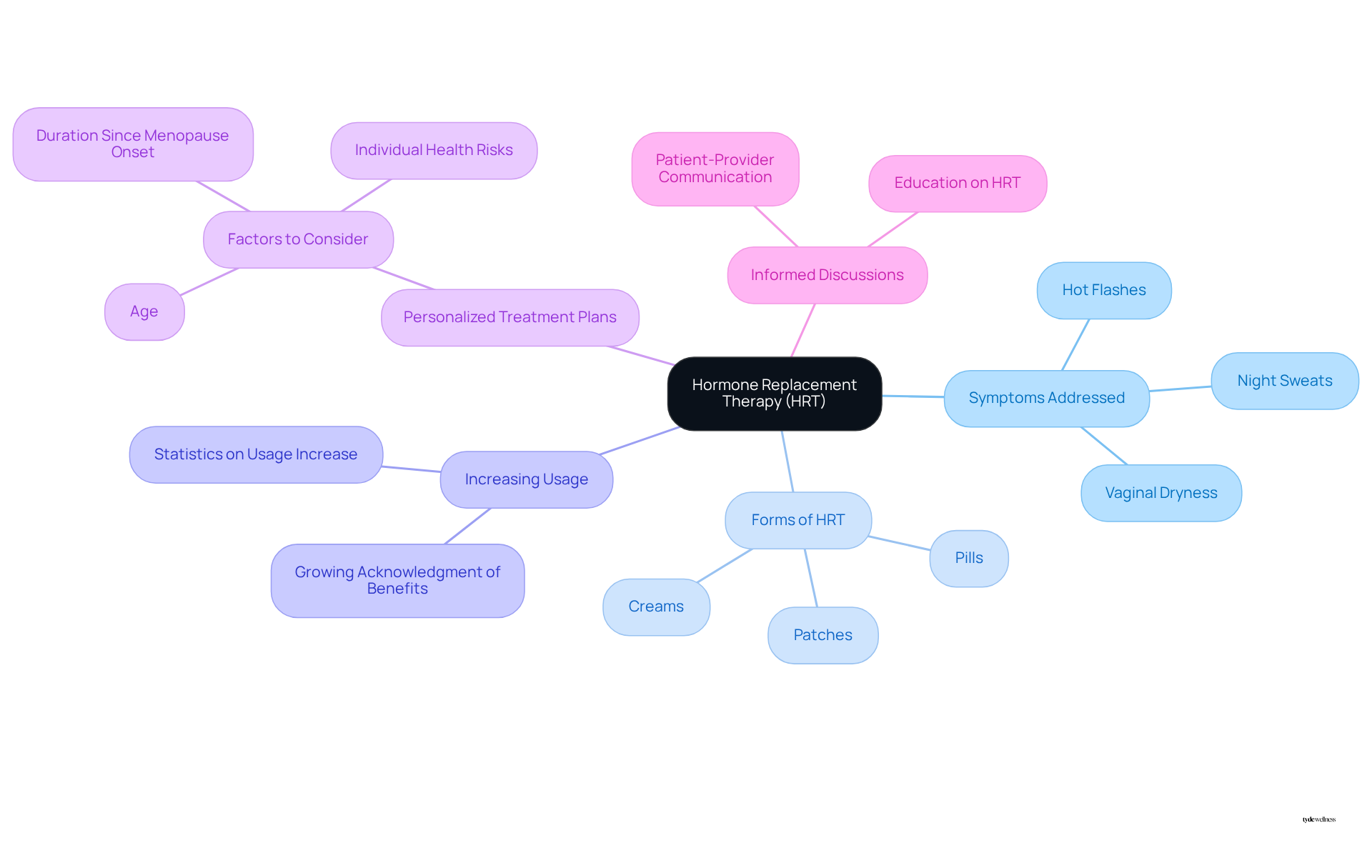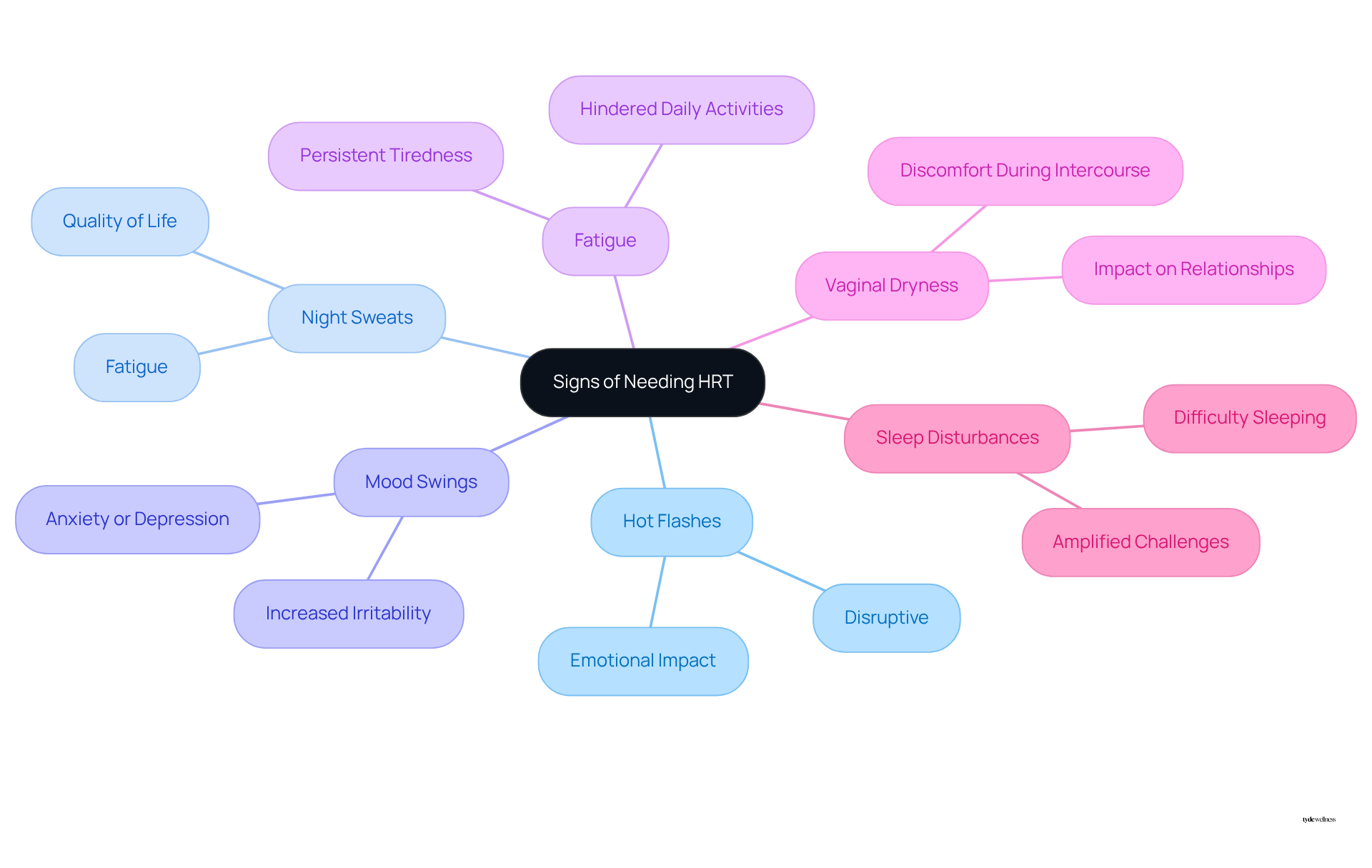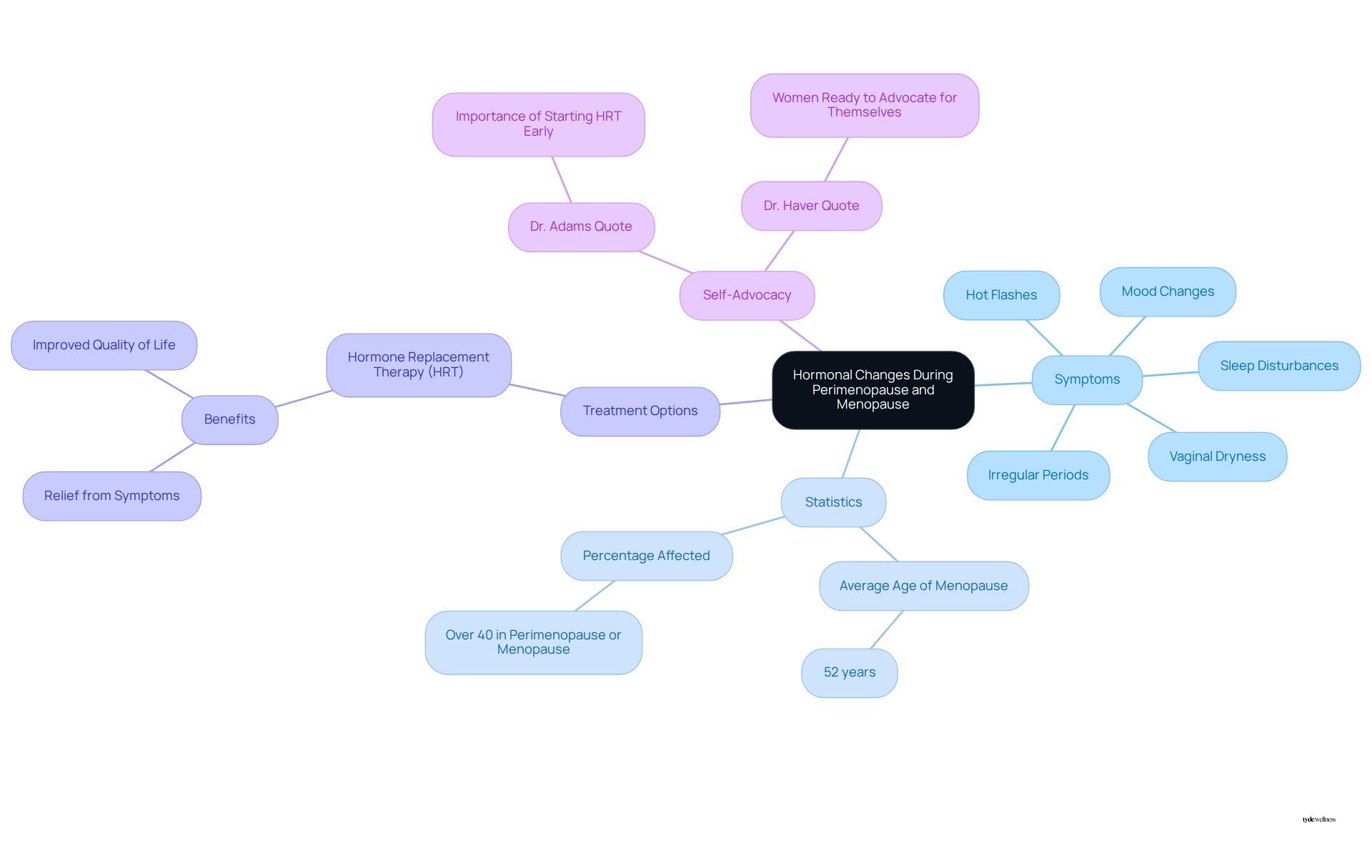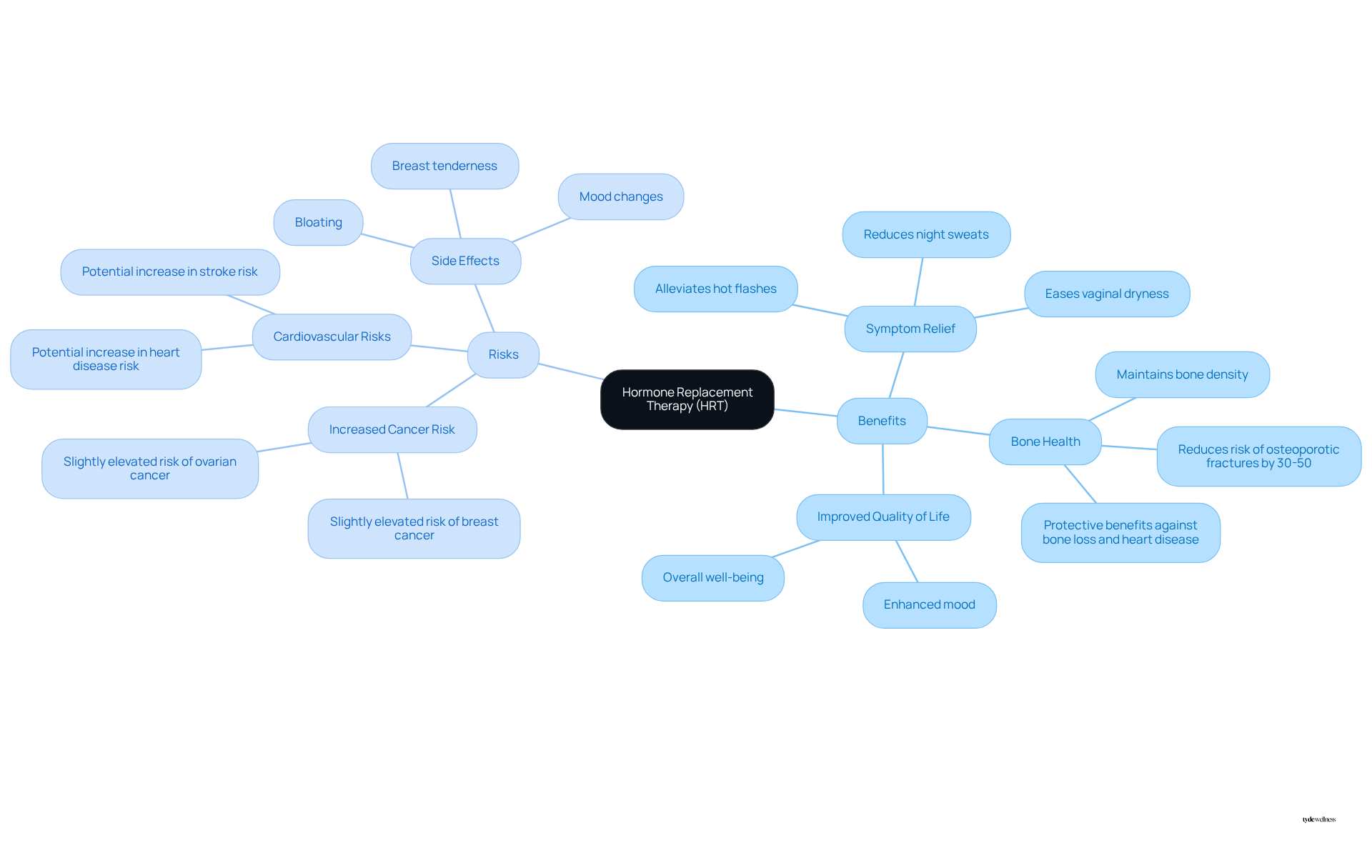Overview
The signs indicating a need for hormone replacement therapy (HRT) include symptoms such as:
- Hot flashes
- Night sweats
- Vaginal dryness
- Mood swings
- Fatigue
- Sleep disturbances
These symptoms are particularly prevalent during perimenopause and menopause. Recognizing these symptoms is crucial, as they can significantly disrupt quality of life. This awareness often prompts individuals to seek medical guidance regarding potential HRT options. HRT has been shown to effectively alleviate these issues, enhancing overall well-being.
Introduction
Recognizing the signs that indicate a need for hormone replacement therapy (HRT) is crucial for individuals navigating the tumultuous waters of perimenopause and menopause. Hormonal fluctuations can lead to a myriad of disruptive symptoms—ranging from hot flashes to mood swings. Understanding these signals can empower individuals to reclaim their well-being.
However, many remain unaware of the specific indicators that suggest HRT may be a beneficial option. Key symptoms prompting a discussion about hormone therapy include these disruptive changes. Furthermore, individuals can ensure they receive the care they need during this significant life transition.
Defining Hormone Replacement Therapy (HRT)
Hormone Replacement Therapy (HRT) serves as a medical intervention aimed at alleviating issues linked to hormonal changes, making it important to understand what are the signs that you need hormone replacement therapy, particularly during perimenopause and menopause. This therapy involves the administration of hormones, primarily estrogen and progesterone, to counteract the body’s reduced hormone production. HRT effectively addresses prevalent symptoms such as hot flashes, night sweats, and vaginal dryness, which may indicate what are the signs that you need hormone replacement therapy, significantly improving the quality of life for those undergoing these transitions.
Recent studies indicate that HRT can lead to improved overall health outcomes, with many individuals reporting enhanced functioning and reduced disease burdens, including cardiovascular issues and osteoporosis. The therapy is available in various forms—pills, patches, and creams—allowing for customization according to individual preferences and medical requirements.
As of 2025, there has been a notable increase in the use of HRT among perimenopausal individuals, reflecting a growing acknowledgment of its benefits. Experts emphasize the importance of personalized treatment plans, particularly in understanding what are the signs that you need hormone replacement therapy, which includes factors such as age, the duration since menopause onset, and individual health risks.
Endocrinologists advocate for informed discussions between healthcare providers and patients to assess the appropriateness of HRT. They highlight that while HRT may not be suitable for everyone, many individuals remain unaware of what are the signs that you need hormone replacement therapy, despite the potential benefits. Real-world examples illustrate that those utilizing HRT often experience significant improvements in their daily lives, reinforcing the therapy’s effectiveness in managing menopausal symptoms.
In conclusion, HRT represents a crucial option for many individuals navigating the challenges of perimenopause and menopause, providing a pathway to reclaiming comfort and vitality during this significant life stage.

Identifying Key Signs Indicating the Need for HRT
Identifying what are the signs that you need hormone replacement therapy is crucial for women navigating the challenges of menopause. Common symptoms include hot flashes, which are sudden feelings of warmth often accompanied by sweating. These can be disruptive and uncomfortable; hormone therapy can alleviate hot flashes and night sweats within three to four weeks.
Night sweats, characterized by excessive sweating during sleep, can significantly impact rest quality, leading to fatigue and irritability. Furthermore, mood swings resulting from hormonal fluctuations may increase irritability, anxiety, or depression, affecting emotional well-being.
Fatigue, or persistent tiredness not alleviated by rest, can hinder daily activities and diminish overall quality of life. Vaginal dryness, which causes discomfort during intercourse or general dryness, can lead to distress and affect intimate relationships. Sleep disturbances, marked by difficulty in initiating or maintaining sleep, are frequently associated with other menopausal issues, amplifying the challenges faced by women.
Recognizing these signs is essential for individuals to seek appropriate medical guidance. Many women experiencing these symptoms report a considerable disturbance in their quality of life, making it essential to explore HRT as a feasible option. Current data suggests that severe menopause symptoms affecting quality of life may reveal what are the signs that you need hormone replacement therapy. Effective management of these symptoms can lead to improved overall well-being, allowing individuals to reclaim their vitality during this transitional phase. As Dr. Adams notes, ‘Hormone therapy takes hot flashes and night sweats away in about three to four weeks.

Understanding Hormonal Changes During Perimenopause and Menopause
During perimenopause, which can commence in an individual’s 30s or 40s, there are significant fluctuations in estrogen and progesterone levels. This hormonal imbalance can lead to various symptoms, including:
- Irregular periods
- Mood changes
- Sleep disturbances
As individuals transition into menopause—typically defined by 12 consecutive months without a menstrual cycle—the ovaries produce markedly lower levels of estrogen. This reduction can result in more pronounced effects, such as:
- Hot flashes
- Vaginal dryness
Understanding these hormonal changes is crucial for individuals to recognize their symptoms and identify what are the signs that you need hormone replacement therapy (HRT) as a potential treatment option.
Statistics reveal that perimenopause may begin up to eight years before menopause, with many individuals experiencing these changes between the ages of 45 and 55. The average age of menopause in the U.S. is 52 years. Notably, over 40% of individuals in the U.S. are currently in perimenopause, menopause, or postmenopausal stages, underscoring the extensive impact of these hormonal changes on female health.
Gynecologists stress the importance of self-advocacy during this period. For instance, Dr. Adams notes that starting hormone therapy within a decade of the final menstrual period can offer significant benefits, including:
- Relief from distressing symptoms
- Improved overall quality of life
Moreover, understanding the roles of estrogen and progesterone in symptom management can empower individuals to seek appropriate evaluations and treatments tailored to their needs. Dr. Mary Claire Haver also highlights the gender health disparity and the need for better options for women, reinforcing the importance of advocating for suitable care during these life stages.
Real-world examples illustrate the challenges individuals face during this time. Many report feeling overlooked by healthcare providers concerning their symptoms, emphasizing the necessity for individuals to educate themselves and advocate for their health. By recognizing what are the signs that you need hormone replacement therapy and understanding the potential advantages of HRT, individuals can take proactive steps toward managing their health during these critical life stages.

Evaluating the Benefits and Risks of Hormone Replacement Therapy
Hormone Replacement Therapy (HRT) provides numerous advantages for women, particularly during menopause. Key benefits include:
- Symptom Relief: HRT effectively alleviates common menopausal symptoms such as hot flashes, night sweats, and vaginal dryness, significantly enhancing daily comfort.
- Bone Health: By maintaining bone density, HRT is crucial in preventing osteoporosis, a condition that affects many women post-menopause. Studies indicate that estrogen treatment can reduce the risk of osteoporotic fractures by 30% to 50%. Current research suggests that hormone treatment may also offer protective benefits against bone loss and heart disease, as highlighted by specialists like Streicher.
- Improved Quality of Life: Many individuals report enhanced mood and overall well-being while undergoing HRT, contributing to a more fulfilling life during and after menopause. However, it is important to note that over 50 million women have not accessed the benefits of hormone replacement therapy, leading to the question of what are the signs that you need hormone replacement therapy, which indicates a significant gap in awareness and access.
Despite these benefits, it is essential to consider the associated risks:
- Increased Cancer Risk: Long-term use of combined HRT may slightly elevate the risk of breast and ovarian cancer, necessitating careful consideration of treatment duration and type. The FDA’s black box warning regarding these risks may deter individuals from pursuing beneficial therapies.
- Cardiovascular Risks: There is a potential increase in heart disease and stroke risk, particularly among older individuals or those with pre-existing health conditions.
- Side Effects: Some individuals may experience side effects such as bloating, breast tenderness, or mood changes, which can affect their quality of life.
Recent research has shifted the consensus on HRT safety, suggesting that the cancer risks associated with some hormone therapies are relatively low. Given these complexities, it is crucial for individuals to engage in thorough discussions with their healthcare providers to evaluate their individual health profiles and understand what are the signs that you need hormone replacement therapy. This personalized approach ensures that women can effectively weigh the benefits against the risks, leading to better health outcomes.

Conclusion
Understanding the signs that indicate a need for hormone replacement therapy (HRT) is essential for those facing the challenges associated with perimenopause and menopause. This therapy can provide significant relief from distressing symptoms such as hot flashes, night sweats, and vaginal dryness, ultimately enhancing overall quality of life. Recognizing these symptoms empowers individuals to seek appropriate medical guidance, enabling them to reclaim comfort and vitality during this pivotal life stage.
Key arguments highlight the importance of identifying symptoms that may warrant HRT, including:
- Mood swings
- Fatigue
- Sleep disturbances
Many individuals remain unaware of the signs indicating the need for hormone replacement therapy, despite the potential benefits. Furthermore, the necessity of personalized treatment plans and informed discussions with healthcare providers is underscored, allowing for the assessment of individual health profiles and treatment suitability.
In light of the extensive impact of hormonal changes on female health, advocating for awareness and education surrounding HRT is crucial. By understanding the signs that necessitate hormone replacement therapy, individuals can take proactive steps toward effectively managing their health. Embracing this knowledge fosters personal well-being and contributes to broader conversations about women’s health and the importance of tailored medical care during significant life transitions.
Frequently Asked Questions
What is Hormone Replacement Therapy (HRT)?
Hormone Replacement Therapy (HRT) is a medical intervention designed to alleviate issues related to hormonal changes, particularly during perimenopause and menopause. It involves administering hormones, mainly estrogen and progesterone, to counteract the body’s decreased hormone production.
What symptoms can HRT help alleviate?
HRT effectively addresses common symptoms such as hot flashes, night sweats, and vaginal dryness, significantly improving the quality of life for individuals undergoing hormonal transitions.
What are the health benefits associated with HRT?
Recent studies suggest that HRT can lead to improved overall health outcomes, including enhanced functioning and reduced disease burdens, such as cardiovascular issues and osteoporosis.
What forms does HRT come in?
HRT is available in various forms, including pills, patches, and creams, allowing for customization based on individual preferences and medical needs.
How has the use of HRT changed recently?
As of 2025, there has been a notable increase in the use of HRT among perimenopausal individuals, indicating a growing recognition of its benefits.
What factors should be considered when determining the need for HRT?
Factors include age, the duration since menopause onset, and individual health risks, emphasizing the importance of personalized treatment plans.
What is the role of healthcare providers in HRT?
Healthcare providers are encouraged to have informed discussions with patients to assess the appropriateness of HRT, as it may not be suitable for everyone.
Are individuals aware of the signs that indicate the need for HRT?
Many individuals remain unaware of the signs that they may need hormone replacement therapy, despite the potential benefits it offers.
What improvements do individuals report from using HRT?
Real-world examples show that individuals utilizing HRT often experience significant improvements in their daily lives, reinforcing the therapy’s effectiveness in managing menopausal symptoms.
Why is HRT considered important for those undergoing menopause?
HRT is viewed as a crucial option for individuals navigating the challenges of perimenopause and menopause, providing a pathway to reclaim comfort and vitality during this significant life stage.
List of Sources
- Defining Hormone Replacement Therapy (HRT)
- Doctors urge FDA to remove black box warning on hormone therapy for menopause (https://npr.org/sections/shots-health-news/2025/07/25/nx-s1-5477644/menopause-hormone-therapy-fda-health)
- Black box warning on menopause hormone therapies should be removed, experts say | CNN (https://cnn.com/2025/07/24/health/menopause-hormone-treatment-wellness)
- FDA panel calls for label changes, more education on menopausal hormone therapy (https://healio.com/news/endocrinology/20250717/fda-panel-calls-for-label-changes-more-education-on-menopausal-hormone-therapy)
- FDA Expert Panel on Menopause and Hormone Replacement Therapy for Wome (https://fda.gov/patients/fda-expert-panels/fda-expert-panel-menopause-and-hormone-replacement-therapy-women-07172025)
- Identifying Key Signs Indicating the Need for HRT
- Menopause and Hormone Replacement Therapy (https://webmd.com/menopause/menopause-hormone-therapy)
- Perimenopause symptoms can be a drag. Here’s when to seek treatment (https://npr.org/2025/05/15/nx-s1-5398547/perimenopause-menopause-symptoms-hrt-hormone-therapy)
- What You Should Know About Hormone Therapy and Menopause (https://cuimc.columbia.edu/news/what-you-should-know-about-hormone-therapy-and-menopause)
- Comparing the risks and benefits of hormone therapy (https://mayoclinic.org/diseases-conditions/menopause/in-depth/hormone-therapy/art-20046372)
- Menopause Hormone Therapy is Making a Comeback: Is it Safe and Right for You? | (https://longevity.stanford.edu/lifestyle/2025/03/06/menopause-hormone-therapy-is-making-a-comeback-is-it-safe-and-right-for-you)
- Understanding Hormonal Changes During Perimenopause and Menopause
- Black box warning on menopause hormone therapies should be removed, experts say | CNN (https://cnn.com/2025/07/24/health/menopause-hormone-treatment-wellness)
- Menopause Hormone Therapy is Making a Comeback: Is it Safe and Right for You? | (https://longevity.stanford.edu/lifestyle/2025/03/06/menopause-hormone-therapy-is-making-a-comeback-is-it-safe-and-right-for-you)
- Navigating your way through perimenopause and menopause > Beacon Health System (https://beaconhealthsystem.org/news/2025/07/17/navigating-your-way-through-perimenopause-and-menopause)
- Doctors urge FDA to remove black box warning on hormone therapy for menopause (https://npr.org/sections/shots-health-news/2025/07/25/nx-s1-5477644/menopause-hormone-therapy-fda-health)
- This woman was prescribed antidepressants. She was in menopause and needed another drug. (https://usatoday.com/story/life/health-wellness/2025/07/23/hormone-therapy-estrogen-perimenopause-antidepressants/85282744007)
- Evaluating the Benefits and Risks of Hormone Replacement Therapy
- US may revise hormone replacement therapy warnings (https://medicalxpress.com/news/2025-07-health-experts-reassess-hormone-therapy.html)
- Black box warning on menopause hormone therapies should be removed, experts say | CNN (https://cnn.com/2025/07/24/health/menopause-hormone-treatment-wellness)
- Doctors urge FDA to remove black box warning on hormone therapy for menopause (https://npr.org/sections/shots-health-news/2025/07/25/nx-s1-5477644/menopause-hormone-therapy-fda-health)
- FDA Panel Challenges Hormone Replacement Therapy Risks (https://managedhealthcareexecutive.com/view/fda-panel-challenges-hormone-replacement-therapy-risks)
- Hormones for menopause are safe, study finds. Here’s what changed (https://npr.org/sections/health-shots/2024/05/01/1248525256/hormones-menopause-hormone-therapy-hot-flashes)